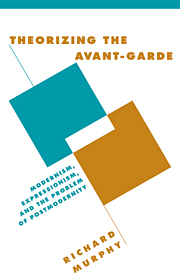
-
Select format
-
- Publisher:
- Cambridge University Press
- Publication date:
- 22 September 2009
- 22 April 1999
- ISBN:
- 9780511483189
- 9780521632911
- 9780521648691
- Dimensions:
- (216 x 138 mm)
- Weight & Pages:
- 0.58kg, 336 Pages
- Dimensions:
- (216 x 138 mm)
- Weight & Pages:
- 0.393kg, 336 Pages
- Subjects:
- Literature, Philosophy: General Interest, Art, Literary Theory, Western Art
- Series:
- Literature, Culture, Theory (32)
You may already have access via personal or institutional login- Subjects:
- Literature, Philosophy: General Interest, Art, Literary Theory, Western Art
- Series:
- Literature, Culture, Theory (32)
Book description
In Modernism, Expressionism and Theories of the Avant Garde, Richard Murphy mobilises theories of the postmodern to challenge our understanding of the avant-garde. He assesses the importance of the avant-garde for contemporary culture and for the debates among theorists of postmodernism such as Jameson, Eagleton, Lyotard and Habermas. Murphy reconsiders the classic formulation of the avant-garde in Lukacs and Bloch, especially their discussion of aesthetic autonomy, and investigates the relationship between art and politics via a discussion of Marcuse, Adorno and Benjamin. Combining close textual readings of a wide range of films as well as works of literature, it draws on a rich array of critical theories, such as those of Bakhtin, Todorov, MacCabe, Belsey and Raymond Williams. This interdisciplinary project will appeal to all those interested in modernist and avant-garde movements of the early twentieth century, and provides a critical rethinking of the present-day controversy regarding postmodernity.
Reviews
"...original and fascinating..." Journal of English and Germanic Philology
"Murphy's book nevertheless makes an entirely persuasive and superbly documented case for the continuing impact of the historical avant-garde on the culture of postmodernity." College Literature
Contents
Metrics
Altmetric attention score
Full text views
Full text views help Loading metrics...
Loading metrics...
* Views captured on Cambridge Core between #date#. This data will be updated every 24 hours.
Usage data cannot currently be displayed.
Accessibility standard: Unknown
Why this information is here
This section outlines the accessibility features of this content - including support for screen readers, full keyboard navigation and high-contrast display options. This may not be relevant for you.
Accessibility Information
Accessibility compliance for the PDF of this book is currently unknown and may be updated in the future.


